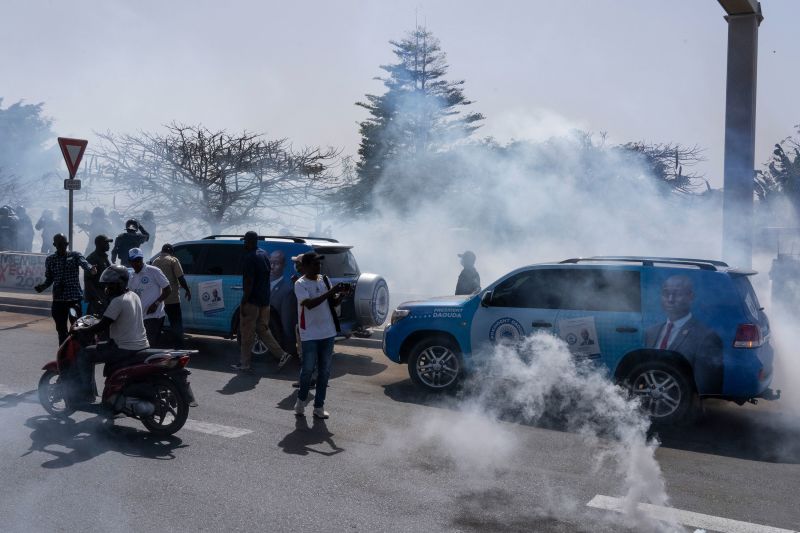
Senegal's Political Turmoil: A Country at a Crossroads

The political landscape in Senegal is in turmoil as outgoing President Macky Sall faces pressure to hold presidential elections immediately following a ruling against his decision to postpone the polls. The country is witnessing escalating tensions and protests as the constitutional council asserts its authority in upholding democratic principles.
Presidential Elections Amidst Turmoil
In a dramatic turn of events, Senegal's incumbent president Macky Sall announced his intention to proceed with presidential elections 'as soon as possible' after facing backlash over his attempt to delay the polls. The constitutional council's rejection of Sall's postponement bid has sparked a wave of protests and clashes between authorities and demonstrators, underscoring the deep-seated political unrest in the West African nation.
Senegalese riot police lobs tear gas at supporters of opposition presidential candidate Daouda Ndiaye in Dakar, Senegal, Sunday, Feb. 4, 2024.
The decision by the top court to uphold the constitutional mandate for timely elections has been met with both relief and apprehension among Senegalese citizens. Civil society groups, dissatisfied with Sall's actions, have intensified their calls for immediate electoral processes to uphold the country's democratic values and prevent any potential power grab attempts.
Senegal, once hailed as a beacon of democracy in Africa, now finds itself at a critical juncture as it navigates through this period of uncertainty and civic unrest. The upcoming presidential elections hold the key to determining the future course of the nation and restoring faith in its democratic institutions.
Constitutional Council's Verdict and Public Reaction
The constitutional court's unequivocal ruling against President Sall's bid to postpone the elections has been a defining moment in Senegal's political history. The court's assertion of its exclusive authority to oversee the legality of national elections has been hailed as a victory for democratic principles and the rule of law in the country.
Public sentiment in Senegal has been characterized by a mix of relief and apprehension following the court's decision. While many view the ruling as a necessary safeguard against potential authoritarianism, others remain cautious, wary of the lingering tensions and uncertainties surrounding the electoral process.
The role of the constitutional council as a bulwark against executive overreach and a protector of democratic norms has been reaffirmed through its firm stance on upholding the constitutional provisions related to presidential elections. The council's verdict has set a precedent for adherence to legal frameworks and institutional checks on executive power in Senegal's political landscape.
Regional and International Perspectives
The political crisis in Senegal has not gone unnoticed on the regional and international stage, with key stakeholders expressing concerns over the unfolding events in the country. The Economic Community of West African States (ECOWAS) has called for all parties to respect the constitutional council's decision and engage in inclusive dialogue to preserve Senegal's democratic gains.
The release of political detainees, including prominent opposition figures, in the wake of the court's ruling signals a potential shift towards reconciliation and political openness in Senegal. The prospect of free and fair elections, coupled with efforts to release political prisoners, offers a glimmer of hope for a peaceful resolution to the current impasse and a path towards national unity.
As Senegal grapples with the challenges of political transition and democratic consolidation, the international community stands ready to support the country in upholding democratic values and ensuring a transparent electoral process. The outcome of the upcoming presidential elections will not only shape Senegal's future trajectory but also serve as a litmus test for the resilience of democracy in the region.











